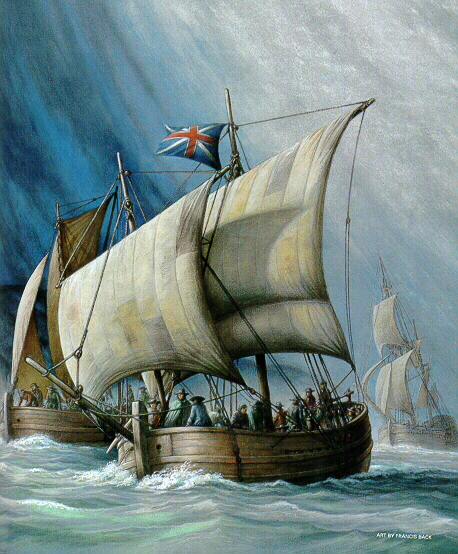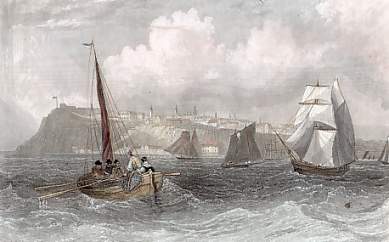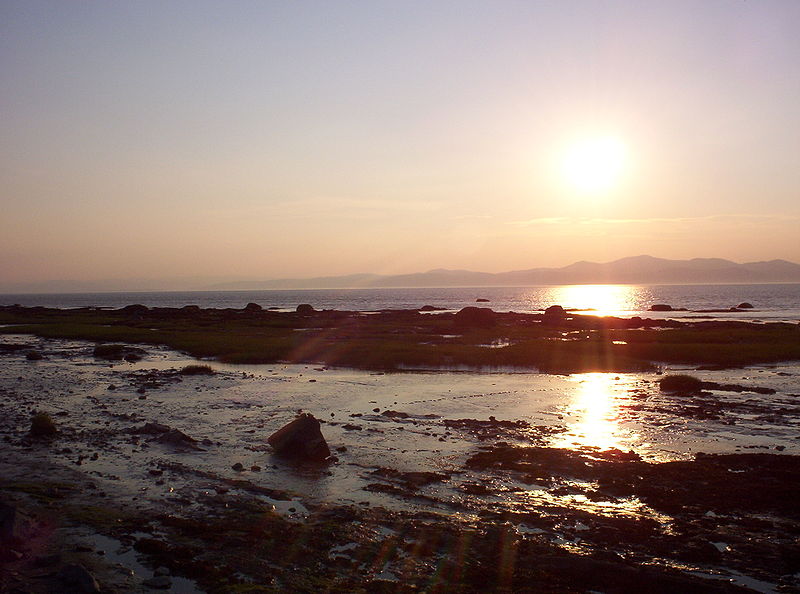The Heroes of Rivière-Ouelle...
While gathering ancestors on my father's side (The Lizottes), I often ran into the designation of 'a hero of Rivière-Ouelle'. Since there are thirteen of these heroes in my family, it seems the incident deserves some retelling.
~~~~~
The year is 1690 and the British are angry, insulted and horrified by Québec's Governor Frontenac's mid-winter orders for three damaging raids on New York and New England. British General Phips of Boston is sent out to even the score. His first and nearest target was Acadia. Its governor was caught by surprise and not in the position to resist, so Acadia was capitulated on May 21, 1690 to lessen further damage. On May 22, Phips records "We cut down the cross, rifled the Church, pulled down the High-Altar, breaking their images"; and on May 23 he added, "...kept gathering Plunder both by land and water, and also under ground in their Gardens." It has been said that 28 houses were burned.
Enough to say, Phips arrived back in Boston victorious and somewhat of a hero, himself. In August of the same year, he set out again. This time the target would be Québec. With a contingency of about 2,000 men and 32 ships, he felt secure in his endeavor, even though only 5 or 6 of the fleet were actually warships.
On his way up the St. Lawrence River, Phips decided to create mischief... burn and loot a few villages. One such settlement would be Rivière-Ouelle.
 A British ketch.
A British ketch.
Speaking through the translated words of the 19th century writer, H. R. Casgrain...
One morning in the month of October 1690, a considerable detachment of Canadian settlers, armed for war, strode through the forest of spruce, fir and maple trees that still shade the edge of the River Ouelle.
The leader of the militia was none other than the parish priest, Father Francheville, a fifty-year old of fiery and impetuous character. "My friends," he told the men of the village earlier, "the news is about war. I just learned by letters from Québec, the English intend to seize the country to avenge the defeats we have inflicted upon them. It seems that a fleet of over 30 sails will soon appear. Already M. de Frontenac has sent detachments of militia to both sides of the river to prevent the enemy from making any landing. It must be believed that our governor is relying on your courage, since he sent none of his soldiers here. I would not recognize you were you to be so cowardly as to allow these Bostonian miscreats to land without firing a shot. You know what awaits you if you allow them to succeed: they will burn your houses, your church, desecrate what's holy as they have already done elsewhere, and they will drag everyone into captivity, you, your wives and children."
"Take arms and be ready for the first signal. "
And ready they were as they listened to the murmur of hurried voices and watched small boats filled with soldiers plying their way to shore. The tide was high and the boats would easily come within shooting range.
English orders were given, oars pulled from the water and the disembarkment began. In the moment of confusion that almost always accompanies this type of activity, the good priest shouted, "Fire!" Explosions erupted. A hail of bullets fell hard upon the stunned soldiers. Many fell dead on the spot, a larger number were seriously injured. In a general panic, the English rushed back to their boats.
For the moment, Rivière-Ouelle was saved by a handful of determined Canadians who got to watch the small British armada sound its way up the river to Québec under the leadership of General Phips. This time it was the steely Governor Frontenac who awaiting them. When a British envoy asked for surrender in the name of the King of England, Frontenac's reply was something along the lines of: Je vous répondrai par la bouche de mes canons! (I will answer you with the mouth of my canons!). Frontenac opened a damaging fire on the fleet below.

Nine vessels were wrecked. A week later, out of ammunition, Phips weighed anchor and sailed for Boston. On his way back home, three more of his ships including a brigantine were lost in and off the waters of the Saint Lawrence.
The story wasn't over, though. At this time New France had a population of about 11,000... New England had 10 times more.
~~~
The Canadians involved in this rout are listed with my thirteen heroes in block print:
François and Joseph Deschamps, sons of M. de la Bouteillerie (he was the seigneur or lord of the settlement)
Robert Lévesque
Pierre Hudon dit Beaulieu
Charles Miville; Jean Miville
Galleran Boucher and his two sons, Pierre and Philippe
Michel Bouchard and his three sons, Étienne, François and Pierre
Pierre Dancosse
Joseph Renault and his son, Joseph
Guillaume Lisot and his son, Claude
René Ouellet and four of his children, Abraham, Mathurin-René, Grégoire and Joseph
Jean Lebel and his son, Jean-Baptiste
Pierre Emond
Mathurin Dubé
Jean Mignot dit Labrie
Noël Pelletier
Jean Gauvin and his son, Jean
Pierre de Saint-Pierre
Nicolas Durant and his son, Nicolas
François Autin
Sébastien Boivin
Jean de Lavoye
~~~~
The source of much of this article is the booklet entitled Une paroisse Canadienne au 17ème siècle (A Canadian Parish in the 17th Century), by Henri Raymond Casgrain, published in Québec in 1880.

A view of the Saint Lawrence River from Rivière-Ouelle.